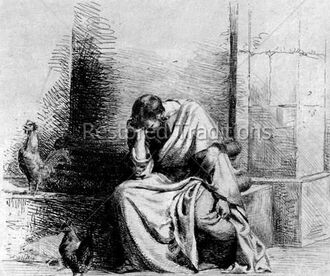 For anyone who's ever felt overlooked or rejected my recent slow reading of Mark's gospel offers hope. I say slow reading of Mark because I'd not really got the energy for a quick read - nor an extended one. More a chapter a day whilst allowing the passage to reveal whatever insight might be helpful of which there were several like this one in chapter sixteen. As they entered the tomb, they saw a young man dressed in a white robe sitting on the right side, and they were alarmed. “Don’t be alarmed,” he said. “You are looking for Jesus the Nazarene, who was crucified. He has risen! He is not here. See the place where they laid him. But go, tell his disciples and Peter, ‘He is going ahead of you into Galilee. There you will see him, just as he told you’” (Mark 16:5-7). Peter is a notable character in the gospels. Forthright, assertive - presumptuous even. He's the leader of the group - the one who is always willing to speak out. On one occasion when Jesus questioned his disciples as to whether they might dessert him along with the rest of the crowd, his response, ahead of the others was: “Lord, to whom shall we go? You have the words of eternal life. We have come to believe and to know that you are the Holy One of God” (John 6:68-69). Peter is driven by his convictions. Later when it came to answering the question, ‘Who do people say I am?’ He’s not backward at coming forward. When Jesus came to the region of Caesarea Philippi, he asked his disciples, “Who do people say the Son of Man is?” They replied, “Some say John the Baptist; others say Elijah; and still others, Jeremiah or one of the prophets.” “But what about you?” he asked. “Who do you say I am?” Simon Peter answered, “You are the Messiah, the Son of the living God” (Matthew 16:13-16). Peter is doing well. His ability to receive revelation, to put himself forward as spokesperson and his willingness to step out of the boat (you remember that story) shows someone courageous and determined. There is much to be admired here. Ever since Jesus called him from fishing on the Sea of Galilee he’s not really looked back. His strength is on show for all to see. And it’s at this point of courage where we can often draw comparisons. How would we have done alongside him? What might we have been able to achieve given the same circumstances? And we’re his story to conclude here we could easily have been left with one picture - but it’s not. In my reading of Mark, we have the ‘man dressed in white’ giving a message for Peter and it’s laden with meaning. When the women at the tomb are told to go and tell the disciples of Jesus the risen one there is one name specifically mentioned from amongst the disciples and it’s Peter. Something has happened that has caused him to be named in the story - a trauma so significant - so scary, so soul destroying that Peter is in danger of becoming lost to his own shame. Most of us know this part of Peter’s story. He has denied Jesus in an act of betrayal - something he thought he could never do. Peter saw himself as stronger than he was and wasn’t comfortable with his weakness - as most of us aren’t. His lack of self-awareness deceived him - leading him to believe he could achieve where others failed. The narrative from Matthew’s gospel reads. ‘Then Jesus told them, “This very night you will all fall away on account of me, for it is written: “‘I will strike the shepherd, and the sheep of the flock will be scattered.’ But after I have risen, I will go ahead of you into Galilee.” Peter replied, “Even if all fall away on account of you, I never will.” “Truly I tell you,” Jesus answered, “this very night, before the rooster crows, you will disown me three times.” But Peter declared, “Even if I have to die with you, I will never disown you” (Matthew 26:31-35 ). Peter’s attitude of bravado is very appealing. We are taught from childhood of the need to be strong and Peter’s earlier rejection by the other Rabbis not to choose him to be their disciple left him to make a living in the family business with much to prove - and this moment, culminating in Jesus’ arrest affords the opportunity to do it. What’s admirable is his simple act of conviction. On the one hand he believes he’s strong enough but on the other takes no time to reflect on the side of himself which can faint with fear when life slips from his control. ‘Now Peter was sitting out in the courtyard, and a servant girl came to him. “You also were with Jesus of Galilee,” she said. But he denied it before them all. “I don't know what you're talking about,” he said. Then he went out to the gateway, where another servant girl saw him and said to the people there, “This fellow was with Jesus of Nazareth.” He denied it again, with an oath: “I don't know the man!” After a little while, those standing there went up to Peter and said, “Surely you are one of them; your accent gives you away.” Then he began to call down curses, and he swore to them, “I don't know the man!” Immediately a rooster crowed’ (Matthew 26:69-74). Jesus has told him how he will disown him - of how three times he will slip further and deeper into the side of Peter he wishes to deny exists and the reality of his weakness is compounded by each act of betrayal. And then the rooster crows. ‘Then Peter remembered the word Jesus had spoken: “Before the rooster crows, you will disown me three times.” And he went outside and wept bitterly’ (Matthew 26:75). I imagine we’ve all had moments when the rooster has crowed and the reality of some part of life giving out under pressure, renders us impotent in the face of fear. It’s a dark and difficult place and the gospels leave us in little doubt as to Peter’s emotional state. He didn’t just weep - he wept bitterly: It tells you everything you need to about his state of mind at this point and throws real light onto why Peter is named by the man dressed in white in our Mark reading. There are times when we can’t simply be part of the group - when the words spoken are collective; sometimes we need to be addressed by name - and this is one such time. Peter’s descent into spiralling failure is something the writer is quick to pick up on. He is not named to be shamed but restored - to be brought back, drawn out of his despair to a place of hope. We need something deeply reassuring to raise us from our bitter weeping. His failure hangs heavy in his soul and somehow, he needs to come to terms with his weakness as well as his strength if he is to be truly whole. It's a painful lesson for him to learn as failure disconnects him from the familiar patterns of life and community sending him into isolation and hiding. He needs to know he's not forgotten or rejected and for this he needs to hear the mention of his name from those with the power to restore him and Mark ensures it is spoken here - as the news of resurrection breaks and the new creation is born the man in white wants Peter to know he is included in this story. This idea of naming goes to the heart of the Christian story. We have not been forgotten or overlooked - no one is invisible before God. The Old Testament puts it this way: “Can a mother forget the baby at her breast and have no compassion on the child she has borne? Though she may forget, I will not forget you! 16 See, I have engraved you on the palms of my hands; your walls are ever before me” (Isaiah 49:15-16). Peter’s story reminds us that we are not loved because of the great things we have done - we are loved because God’s heart to each of us is paternal. He loves us because we are his children - and that applies to each of us, you, me, and Peter.
2 Comments
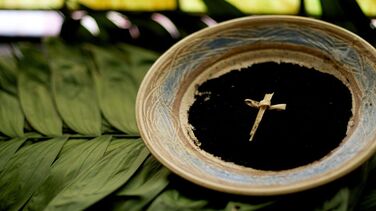 The good thing about a homily is it's intended to be short and when it comes to writing about death that's probably no bad thing. Today is Ash Wednesday and so, perhaps better than any other day of the year, a few words on the topic is appropriate. After all, death is the ultimate statistic and the reality none of us can avoid. I'd not started the day thinking I would write about death but this morning I was burning a few sticks to create ash for our service and the moment grabbed me. The flame reducing something that had form and shape into black ash did its job. As the scriptures say, 'For dust you are and to dust you will return.' I now have the sign of the cross marked on my forehead in that ash. Thinking of our mortality is something most of us prefer to avoid and society has engineered that avoidance with all the necessary distractions to ensure this happens. The reality however is far different. I'm a Pastor and so one of my privileges is to walk with people through difficult seasons of life - and this includes pain and loss. This past month has seen me officiate a funeral service, attend another one and engage a conversation where a young child unexpectedly lost a parent who was in their thirties. And that's just what is close to home. Like the rest of us I am at a loss to contemplate the horror of the earthquake affecting Syria and Turkey and numbed to almost indifference over the year long war in Ukraine. Death is all around us. So what are we to make of this reality called death that casts a long shadow over our lives? The writer of the book of Ecclesiastes says, 'I have seen the burden God has laid on the human race. He has made everything beautiful in its time. He has also set eternity in the human heart; yet no one can fathom what God has done from beginning to end. (Ecclesiastes 3:11-12)' Credited by many scholars to be written by King Solomon here we have a man trying to wade through his own fate and make sense of the life he has been given. Personally, the comment: 'He has also set eternity in the human heart' offers a clue, a lens through which to consider our mortality. Death's entrapment can of course leave us in the grip of fear - and as such weigh heavy on how we live out our existence here on earth. We have one life and as such desire to protect it: over protect it even. The writer of Hebrews puts it well. In speaking of Jesus and his accomplishment in the world it says: 'Since the children have flesh and blood, he too shared in their humanity so that by his death he might break the power of him who holds the power of death—that is, the devil— and free those who all their lives were held in slavery by their fear of death. (Hebrews 2:14-15)' There's something very robust in these comments - death meets its match in Jesus and in overcoming it throws darkness into disarray. Back to the ashes, I'd omitted to mention that creating them came off the back of viewing lasts nights Panorama programme Ukraine's War Diaries whereon a young guy who previously lived, in his own words, a self-obsessed life is now given to rescuing people from the front line and putting his own life in grave danger in the process. His conclusion? With tears in his eyes, he says the threat on his own life to save others has made him a better person! Living closer to death has caused him to be more alive. Which is what reverence for our mortality is meant to do, right? To make us braver; less fearful - humbler. To coat us not in Teflon but in grace; to realize that each day offered is a gift - and that gifts are always best when given rather than received. Or, as someone once said, 'Greater love has no one than this: to lay down one's life for one's friends. (John 15:13)' 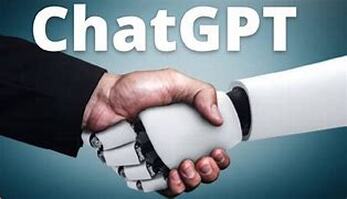 ChatGPT seems to be the talk of the town now – so we thought we’d try it out on sermons! For those unfamiliar with this latest phenomenon here is a little background: Open AI is an artificial general intelligence (AGI) research and deployment laboratory that aims to generate AI that benefits humanity. It was founded on December 11, 2015, by Sam Altman (the former president of tech start up Y Combinator) and Elon Musk. In 2019 Microsoft invested $1 billion dollars in Open AI as one of its backers. On 5 December 2022, one week after the launch of ChatGPT, the CEO tweeted about the achievement made by the model. Seeing the growth of ChatGPT, it is expected that it will soon cross 1 billion users by the end of the last quarter of the year 2023. (Source Google) My understanding is its currently at 40 million users in under two months – something which took Twitter a year to achieve. We used an online app called smodin.ai to create a few ‘sermons’ one of which is shown below. In the app you give the title and then it generates three talking points to create the talk from. Out title was: What does it mean to be a new creation in Christ from 2 Corinthians 5:17 where the apostle Paul writes – ‘Therefore is anyone is in Christ, the new creation has come: the old had gone and the new is here!’ The three options it created (you can edit these if you wish to – in this case we didn’t). The self-generated talking points from our questions were: • The apostle Paul describes the creation in verses 4-6 as an old, worn out useless garment • The new creation has been brought about through the blood of Christ and is therefore completely free of sin • Since the new creation has been brought about through Christ, all negative attributes from the old creation have been removed and replaced. And within a couple of seconds this is what it ‘wrote’ … unedited The apostle Paul wrote to the church in Corinth that they were not only his colleagues and fellow workers in the gospel, but they were his friends. Paul referred to them as beloved in his letter to the Philippians. He also prayed for them that the Lord would grant them faith to remain steadfast in the gospel despite any obstacles that would get in their way. Here is what he wrote to them about being new creations in Christ: When Paul first wrote this, he was reminding people of how their old, worn out creation had been replaced by a new creation in Christ. The old creation was now past its usefulness since it had died on the cross. On the other hand, the new creation was now ready to bear fruit and bring glory to God. To illustrate this concept, look at a worn out garment which needs replacing. The old garment is still quite beautiful and functional- except that it is tattered and needs replacing. The same applies to humanity before the cross. We were once glorious creatures whom God had made perfect and sinless. We were also created to have dominion over all earthly creatures and to rule over the earth as kings. However, when Adam and Eve disobeyed God, they lost their perfect standing as new creations in Christ. They also lost their right to have authority over earthly creatures and the earth itself. As a result of Adam and Eve's downfall, they became impotent sinners who could no longer control their sinful desires or have dominion over anything outside of God's will. Instead of being masters, they found themselves subject to being crushed by everything around them- until Jesus came and died on their behalf as their substitute sacrifice. Just as Old Testament Israelites needed to be purified by sacrificing animals Molech before entering God's temple, Adam and Eve needed to sacrifice something prior to entering God's temple again. After Jesus' death and resurrection, all sin had been forgiven through His shed blood on the cross; so when believers accept Christ as their Savior, the sin debt is canceled and they are now empowered by God's Holy Spirit. As a result, believers are now able to live holy lives pleasing to God instead of being controlled by sinful desires like they once were. Since the new creation has been brought about through Christ, all negative attributes from the old creation have been removed and replaced with positive traits. For example, human beings used to be mere animals with no intelligence or reasoning powers- waiting to be subjected to someone else's will like other earthly creatures. Now that believers are new creations in Christ, they are no longer mere animals with no reasoning powers but are made holy through the power of the Holy Spirit living inside them. Because of this change, believers no longer seek gratification from earthly things like food or money but from God alone. They do this because they want to please Him rather than please themselves. Living for Him instead of for self frees people up not only physically but also spiritually since believers can now freely receive spiritual gifts from God that empower them for service in His kingdom. When people look at their old useless creation before Christ, it brings tears of sadness since it is no longer useful or glorious like it used to be before the cross. However, when people look at their current new creation in Christ, things are very different since we are now both spiritually powerful and holy individuals who can choose between good and evil without any negative influence clouding our minds anymore! Since we are now completely free of sin while also having supernatural power given us directly by God Himself- there is nothing greater than being a new creation in Christ! END So there you go – a sermon written by AI (not edited in any way) – whatever next – my sermon series written by AI and presented by my virtual reality Associate Bible Teacher whilst I’m holidaying in the Bahamas?! For sure you can see the flaws in it, the lack of nuance etc – but it’s interesting none the less for brand new technology. Whether to be terrified or excited – well that’s a different matter completely – but it appears this technology is roaring ahead whatever we might make of it.  One of life's privileges must be the ability to read - or listen to books. There is something quite beautiful about a well-crafted and presented book whereby you feel enriched simply by holding it! And there is something quite amazing about Audible and the ability to listen to books on the move - which without doubt has increased my capacity to enjoy more of them this year. So, with this in mind here are some of the books I've enjoyed either reading or listening to during 2022 with a sentence or two as to why. When Everything's on Fire - Faith Forged from the Ashes by Brian Zhand I've very much enjoyed reading the work of Brian Zhand in recent years - his desire for a robust and historic faith that draws deeply on orthodox tradition has been a source of comfort and especially as I continue to question the fundamentalism of my early adulthood. Here Brian does a great job of questioning and then reconstructing a faith around the centrality of Jesus - a real blessing. The first half of the book is exceptional in my mind. Dominion: How the Christian Revolution Made the World by Tom Holland For those familiar with the Rest is History podcast Tom Holland will be no stranger. His amazing work Dominion is a fascination trace of the development Western Civilization and the role Christianity played in this and provides fuel for the debate around how society will fair in the future. For those who enjoy picking holes in the negative impact of faith on society would do well to read his work as part of a considered response to the current progressive debate lest we end up throwing out babies along with the bath water. Sophie's World by Jostein Gaarder I never learned much about philosophy at school - this was my introduction presented in narrative style. I'd had the book for some years and it was the Audible option that hooked me in this time. Sapiens: A Brief History of Humankind by Yuval Noah Harari This is a fascinating insight into the progression of humanity from ancient civilizations to the current day. The inevitable evolution of humanity is clear from the book - the power of culture is unforgiving and the advent of the modern era is both enlightening - and I guess terrifying in equal measure. Prisoners of Geography: Ten Maps That Tell You Everything You Need to Know About Global Politics by Tim Marshall I started to read this book prior to the war in Ukraine and so when that happened the geography of the region and the politics around it made so much more sense. On completing the book I was left with one outstanding conclusion: the world is determined by geography as much as it is by money - I did not clearly understand this before I read this book. Kleptopia: How Dirty Money is Conquering the World by Tom Burgis With the world clearly focused on the horrors of Ukraine I had to read this book! It is a truly fascinating insight into the world as it is rather than how we might wish it to be. If you watched McMafia you know what you are getting into with Kleptopia. How Not to Be Wrong: The Art of Changing Your Mind by James O'Brien O'Brien's ability to think clearly and express himself thoughtfully is a true gift for a journalist - but to take that gift and apply it personally to previously held positions demonstrates a level of curiosity and vulnerability that is heartwarming. It's not that you might agree with all his conclusions but to see how he arrived at them is a gift he now offers to us all. A Burning in My Bones: The Authorized Biography of Eugene Peterson Peterson was known as the Pastors, Pastor - and not without reason. Godly, humble, consistent - yet not without flaw, this biography is a true step into his life and what flowed from his heart and brain. A legend in his own lifetime, we see few of this caliber. If you ever read the Message version of the Bible then you are reading his work - and if you enjoy his work you'd do well to read about his life. Living An Examined Life: Wisdom for The Second Half of The Journey by James Hollis This book was a gift to me during a season when I really needed it and I’ve read it again this year. Finding the courage to face your demons and fears is the most anyone can offer - and Hollis does it in shed loads. I will never be without this book.  When the Magi came from the East sometime after Jesus' birth, their arrival stirred panic for the establishment. These wise sages of a distant land came with enquiring hearts asking, “Where is the one who has been born king of the Jews? We saw his star when it rose and have come to worship him." Their intent for homage caused disturbance amongst the streets of Jerusalem, and not only for the Jewish stock but more notably their self-imposed Lord and King - Herod the Great. Herod's rise to kingship was notable and he'd quickly shown himself as a master builder of his time with many of his achievements featuring heavily as the back drop to events in the New Testament. He was born in the 70s BC from an Idumean family and along with his father, Antipater, had shown great commitment to Rome. The family’s loyalty and connections allowed Herod to receive a governorship in Galilee at the age of twenty-five, but then after his father’s assassination, he fled the land returning to Rome, where he was officially crowned king of Judea. Returning back in 39 BC, he eventually regained control of the land and ruled there for the next 33 years. Herod was a jealous and some might say, insecure ruler. He feared for his kingship and ruled by power and coercion. So when this threat to his position came to his attention by the Magi he was intent on destroying it. He was the king of Jews - there would be no other. The Jews lived under his rule and yielded taxes to Caesar in return for the permission of remaining in their homeland with certain freedoms. Yet they lived with a yearning for the Messiah to come, a deliverer who would set them free. This idea of freedom ran at the heart of the Jewish story and lived on from one generation to the next captured in the traditions it carried and the messages it told. As a people they had celebrated freedom from the Egyptians some two millennia before and romanticized the idea that deliverance would come again - that a new Moses would come forth. In the Empire even the slightest idea of an uprising - the potential of a saviour coming to silence the dominance of Rome was treated with both immediacy and permanence. Honour the Caesar and all will go well with you, defy him; well they invented a very nasty way of dealing with the rebellious – they called it crucifixion. Not that you had to reach adulthood if you were perceived as a threat – the Empire would search you out much sooner if needed. And so the Magi who’d informed Herod of the star and the baby slipped out by the back door and left him fuming with rage once he realised. He commissioned his soldiers to make an extensive search of Bethlehem and kill every baby boy under the age of two leaving a community bewildered and grief stricken by his brutality. Yet beneath the savagery, politics and tyranny another story was being born. One that was wrapped in mystery and humility, foretold in prophecy and protected by angels and dreams. There are in fact few texts that speak of the birth of Christ, yet those which do carry both weight and wonder. They speak a message that is counter culture and intentionally subversive in the manner through which the person of God will come into the world. Perhaps it’s their scarcity that makes them more poignant, as if God had considered that a ‘less is more’ approach to the birth in Bethlehem would draw us to a place of awe and wonder – rather like those Magi after their one thousand two-hundred-mile trip from Iraq. But for those of us engaging with the story some two thousand years later a further threat does exist that can twist the plot of Christmas and deliver what might simply be a cold turkey - it's called sentiment. For many the sincerity of the story has given way to the sentiment of the nativity in the manner in which the Christmas message is handled. Of course we all love to watch the nativities; to hear the simple songs that brings us again to a retelling of the old. Yet there is danger here. A genuine risk that the stark power of this teenage virgin giving birth to the Christ child could be lost. This for me is why the nativity should always be set in the context of prophecy, history and eternity. The story is spoken to us embryonically over half a millennia before it is fulfilled. The prophets of old had voices that could not be silenced when it came to speaking out about the future and of what would come to pass as Isaiah reminds us: For to us a child is born, to us a son is given, and the government will be on his shoulders. And he will be called Wonderful Counselor, Mighty God, Everlasting Father, Prince of Peace. But it's not only what the prophets said that gives our nativity bite. It's what the gospels portray too that matters. History flows through the story weaving together a narrative that presents characters who lived with both geography and chemistry. Herod, that previously mentioned psychotic ruler of Judea was a mad, cruel, egotistical tyrant. His reign places our story in history – both in time and place. We know much about him from the historians of the day who speak of both his brutality and brilliance, his desire to appease his people on the one hand and silence them harshly on the other. We all know of the fear that tyranny can bring. Bethlehem is a blood bath of brutality. The prophets speak into history their voices carrying the pain of nursing mothers whose grief cannot be silenced, like these words from Jeremiah. “A voice is heard in Ramah, weeping and great mourning, Rachel weeping for her children and refusing to be comforted, because they are no more.” But the dream is not lost and the angel speaks and the Christ child is quietly removed to the safety of Egypt, a trip paid for by the gold slipped into the manger by the Magi who offered such after their nomadic journey from the East. So protected and living as a refugee in a foreign land the Christ child waits. The promise lingers but cannot be silenced. And the story lives on. It has to live on and will live on because it cannot be crushed. It lives on in time and carries hope into eternity. The baby’s birth in the small town of Bethlehem carries hope to our world today - for you, and me. And this matters - it matters more than we could ever grasp. For here in the story light breaks forth into the darkness. As the gospel writers speak, "In the beginning was the Word, and the Word was with God, and the Word was God. He was with God in the beginning. Through him all things were made; without him nothing was made that has been made. In him was life, and that life was the light of all mankind. The light shines in the darkness, and the darkness has not overcome it." This impenetrable light is what lies at the heart of Christmas. It's what lies at the heart of creation itself. It is this light that can enter the darkness of our souls and bring light and love and peace. Here the Christ child comes to us and becomes one with us. He identifies with our fears, sees our failings and reaches out to us. And this is it. He reaches out to us. Complexity may surround; fear may try to overwhelm; despair may seek to overtake us - but he reaches out to us. Here is where the story takes a twist - contextualized as it is in the dusty streets of Palestine, nevertheless it reaches into the souls of each one of us today. The eternal longing, the divine itch, the inseparable search for hope and truth comes close by. Silently the wondrous gift is given and silently it drifts on by. Unless. Unless you, and I and us - unless we the intended recipients of the promise reach out too. Not to give but receive. Not to fight for an inheritance that was never ours - but to enter into the fulfilment of the Divine plan - a plan that had been kept hidden for ages and generations but is now revealed in Christ - and, if you dare to believe it, is fulfilled in each one of us today. For me, this is why the nativity still has power; why the carols still carry mystery and why the message of Christmas is so compelling. It’s not because I can read about it, but rather because I am invited to be part of it.  I came to faith as a teenager and was baptised soon afterwards. All this happened in addition to me being christened as a baby, an event that I knew little about apart from being told I was adorably cute - I know some things are harder to believe than others! For those of us who embark on the road of baptism we do well both to know and explain why. Why bother with the fuss of wet clothes and damp hair on cold days when staying dry and keeping warm is important. Why go through the challenge of standing in front of people to explain our faith and actions. What does it matter? After all, isn't faith a private matter? Seriously not. Faith is far from private. However, this is not the point. Baptism matters because of where it leads. Followed through and worked out, baptism is an important step in the journey of faith and in the Bible is likened to the Israelites crossing the Red Sea or Noah and his family being saved from the flood by climbing into the ark. Baptism is both symbolic and spiritual. It’s symbolic in so much as it is associated with events of deliverance in the scriptures like those just mentioned. In the same way that God delivers his people from their enemies so God though baptism delivers us from our sins and sets us on the pathway to a new life. Baptism isn’t simply about looking back, but more importantly going forward; of taking the next step of a new life with Jesus. Baptism is spiritual in so much as it points strongly to the work of Jesus and his death on the cross. In this act of dying we see that Jesus is raised to new life. Equally through baptism we identify with Jesus’s death in going into the waters and with his resurrection life in being raised up out of them. This coming Sunday is a wonderful occasion at Hope when four people who have made a decision for themselves will get baptised. It is for each of them a step of obedience and personal choice. We recognise in them an acknowledgement of God’s work through Christ and their desire to continue to walk with him. In our spiritually curious world which offers a plethora of religious alternatives I am ever grateful for the clarity that baptism brings to our faith. It is a truly important step, one not to be taken lightly or without proper thought, but when entered into with sincerity and faith combines to be a defining moment in a spiritual journey that has hope, freedom and forgiveness at its heart. 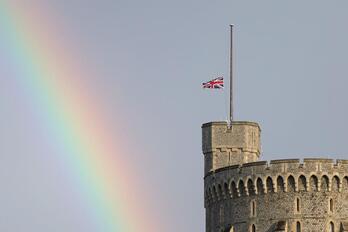 There will not be another day like this in my lifetime. I don't speak as a husband, father or son but as a citizen. This is a day we knew would come, yet thought would never arrive. How could it? For most of us alive we've never known a time when Queen Elizabeth was not our Monarch - she has abided as that one constant through every changing season of our nation. I was but a young boy of 12 when we celebrated the Queens Silver Jubilee and hidden somewhere away in the archives I still have my commemorative book mark from Selectus Ribbon Makers of Biddulph, a company long since past into history whilst only this year we went onto celebrate her Platinum Jubilee. And that's the point. Today brings with it a profound sense of loss - yet more than this, of disorientation. In trying to come to terms with my own feelings, I struggle to reconcile how one can be moved so deeply by the loss of someone I didn't know personally. My closest encounter with Her Majesty was a view of her on the balcony of the Council House on Nottingham's Market Square during her Diamond Jubilee in 2012 and to be honest I've never presented as an ardent Monarchist - but this is different. Moments of this magnitude remind us of something we ought never to forget - and that's our collective consciousness. 'No man is an Island,' wrote John Donne, and for all our individualism today reminds us that we are, at heart, creatures of community. Nations are forged and fall on leaders and communities are held together by the invisible qualities of good ones and subtly corrupted by the toxic actions of poor ones. Oft times we fail to realize this - we think we can tamper with values of decency and faithfulness with no ill effects caused to the collective whole. Like pouring sewage into the seas or carbons into the atmosphere we believe our toxicity will have little impact only to realize when its too late of the deep peril of our state. Our loss today is not only of our Monarch - but also of what she quietly stood for. These qualities are not given to short termism, quick fixes or sound bites. We celebrate her life in part for who she was - but equally for how she held herself. The complexities of life are not dealt with through simplicity as much as they are longevity. Of consistently turning up, serving, offering oneself - of seeing past me to the other - to understand the community and how our consistency plays a vital role in its ongoing cohesion and flourishing. The reality is we can't monetize these things - so therefore we don't always value them. Yet at the same time we do know when we are loosing them and that's part of our grief. We are desperately looking for such qualities: longevity, grace and service and we struggle to find them. No wonder we mourn what we have lost and that the heart of a nation is torn - we are witnessing the passing of an era and in that passing the qualities we only know are important when they are no longer with us. Where will we look for these things? Politics, education, the free market, religion? No these things are not borne of institutions but rather are embedded in the hearts of people - persons, who are prepared to live to a higher calling than simply self interest and Queen Elizabeth modelled this and did so through good times and bad. And so our feeling of loss is not only for who she was - but what she represented. And what she represented are qualities that hold peoples and communities together. There is something to longevity, consistency, to service delivered over a lifetime that is not easily replaced and part of understanding something of the disorientation of this day, as well as our grief, is in seeing this. Of one thing we can be sure we will never witness another Monarch like this one in our lifetime. What we'd better pray is that the qualities she embodied live on in her people she has left behind. 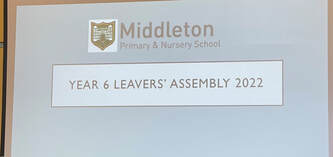 Today was the day when grown adults reach discreetly into their pockets in search of handkerchiefs and tissues to wipe away a slowly forming tear from the corner of one’s eyes in the hope that no notices. It's that joyous, yet sobering occasion which mixes smiles and sadness in equal measure whilst watching a selection of photos past and present played to music to remind you that nothing stays the same. Yes, you've guessed it today was Leaver's assembly for our wonderful son, Noah. His seven years at Middleton Primary have come to an end. When he first entered the school (not a foregone conclusion at the time, and it took a well fought battle with Jo at the helm to secure his place) in reception the thought of him leaving for Secondary felt like a lifetime away. Seven Christmas times would need to pass. Seven summer breaks would need to come and go. Seven Easters. Seven Sports days (save for those ruined by Covid) - it all felt like a long time away. But now it’s here. They have passed. Those years have gone. And I feel upset; and happy; and sad; and proud. I feel like I want to press pause - but life, as we know does not come with a pause - only a process, only the opportunity to be present in each moment. I might have thought that a man of my age and experience that these 'rites of passage' moments would become easier - but they don't. Or at least in my experience they don't. Perhaps it’s my melancholic tendencies; my pensive mood to think too much and at times, too deeply. Whatever. One thing is for sure - for Noah Primary is over - and the adventure of Secondary awaits. But for today we must hold the moment. Tomorrow's adventure will come soon enough. For now, I should treasure the memories and remind myself that each day is precious, every experience is valued: that each of us are made by the days we live and the way we live them. It's not easy being a parent. The emotional roller coaster of highs and lows is part of the deal as you measure off your failures against your successes in the hope that the latter outweighs the former. But the years never return. There is no reverse, no pause - just today. The moment we are given to love and linger and that's what Leaver's Assemblies do - they create that moment to linger. A time to ask how are we doing? Where can we do better? What have we done well? I know I'm not alone in thinking this way - and probably not alone in shedding a private tear. The question is what should we do with those tears? Let them be a reminder of what really matters - that's a good place to start. Allow them to tweak those areas of change that make us better parents - those small incremental adjustments that over the years make us wiser and braver in our watching over those entrusted to us. Allow us to mark off the years knowing we have sought to live in the present rather than pine after the past or look too impatiently for the future. As parents we all love our children deeply and passionately. That today causes us to pause, reflect and remember is not a bad thing. Noah has an amazing mum, wonderful siblings and a great family. Today was the closing of a chapter for all year six kids – a day for parents to shed a tear as we see the years pass by. Tomorrow is the start of a new day. The mood today? Pensive, yes, and grateful – for sure. 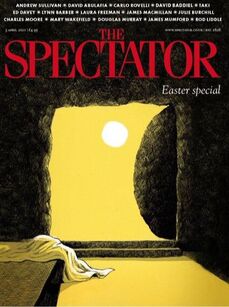 The empty tomb is not a metaphor as much as it is an event recorded in history within the sacred text of the Bible; that the Spectator should feature the image on the front cover of its Easter edition is testament to its enduring message in the midst of secular society. The cover presides over the article ‘On the Rise of Spiritual Consumerism’ written by James Mumford brother of Marcus who is lead singer of the band Mumford and Sons. The brother’s parents John and Ellie Mumford are founders of the UK Vineyard Church Movement and it is from this up bringing that James draws on his Easter piece. Mumford writes about his early days in the Vineyard and how they drew on the distinction between spirituality - the vogue term around which his church experience appealed, and religion - a word assigned to be forgotten and lost to history. Latterly he has changed his position to establish the place of religion in life by pointing to the fact that transformation is an arduous rather than glitzy affair. 'There is a beautiful banality about belonging to a particular community.' he writes, 'Nothing could be less sexy than the Bible study I ran with my wife Holly for our local Anglican church. But because the people who came were committed to it - turning up week after week - what started out as an awkward and disparate group of strangers of all different ages and backgrounds morphed over time into a diverse community where people slowly started to feel they belonged. What happened there was not dramatic, but it was profound.' In truth I think at its best this is what religion does - it creates community out of disparity - a coming together around a creed, a confession - and the Christ. What happens in that setting of ordinariness is the formation for which each soul searches - community and connection. I used to see this all the time pre-Covid, how a small group here and a gathering there become life lines of community and hope - and oh, how its needed. Recent statistics for the UK saw 8% of adults who were "always or often lonely" - representing 4.2 million people. That phone call you make, card you send or meal you cook become the real life lines - it is here in the nitty gritty of every day life when in the midst of your own busyness you extend a hand to another that the work of true religion takes place. As the apostle James wrote: ' Religion that God our Father accepts as pure and faultless is this: to look after orphans and widows in their distress and to keep oneself from being polluted by the world. (James 1:27)' In my earlier years I would have been amongst those happy to lose my religion and wear its ousting as a badge of honour - those fine young radicals who would have burned the hymn books and consigned liturgy to history as we forged ahead with the spirituality of the modern age. Now I am not so sure. Turning up week after week - saying my prayers, offering juice to my lips and entering conversations in a community of diverse people feels quite other worldly. When we gathered in person for the first time for a long time over the Easter weekend the whole encounter felt an emotional affair. As if it were meant to be that way - forgiving those who offend me, extending grace to those who pass by, taking time to endorse the stories of people I otherwise would never meet. This is religion - not the latest trend to capture the market but a collision at the old rugged cross where, if I stay long enough - and come back time and again, my life will be slowly and irreversibly changed. It's an odd thing is religion - but one is left to ponder whether it might still present itself as being the foundation to inner contentment and community flourishing and losing it is, perhaps, best avoided. Stepping From Under the Cloud Of Self Consciousness to the Light Of Self Awareness - A Few Thoughts.2/3/2021  One of the abiding memories of childhood was the day I was made to stand in front of my class at Woodhouse Middle School and talk for five minutes about a favourite hobby. Mine was building model airplanes out of balsa wood, and many a spare hour was given to building, flying - repairing and flying them again. But the thought of standing in front of the class to tell my tale of model building terrified me. It literally left me filled with dread. In fact, it was so bad that although our turn was taken alphabetically I was the final child to take the step having tried frantically to avoid my ordeal. So when the dreaded moment was finally forced upon me I simply froze in embarrassment, blushing profusely and stuttering painfully whilst praying desperately for the ground to swallow me up. As you might imagine its an abiding memory of school - as are many other occasions when my own conscious self left me paralyzed. Since then I've discovered that living self consciously is an onerous ordeal which impacts every aspect of our development and often crushes us with shame. Over the years I developed mechanisms and structures to disguise my own feelings of deep inferiority and fear. Some would become hidden in plain sight - like public speaking for example, which I learned, painfully at times, to master and later to hide behind. My ability to master oratory gave me a platform that I couldn't easily maintain in other areas of life. My self conscious persona coupled with a compliant nature left me, for example, pleasing people when it came to holding an opinion in one on one dialogue rather than standing my ground. People assumed that because I could hold a microphone and project my voice the public persona portrayed the private individual. It did help, of course - but it was a far cry from the havoc of being crippled by self consciousness. For those surprised by my predicament, may it serve as a reminder of Plato's exhortation to: 'Be kind for everyone you meet is fighting a hard battle.' The hardest battles we fight are often the unseen ones - those which cripple us through in action and leave us captured by fear; and whilst ever we remain self conscious of our inadequacies we won't find the courage to defeat them. It's into this arena that much unlearning and relearning must take place. Living self consciously seriously hinders the unlearning necessary to move on. We assume a nature on ourselves that is often inflicted by past trauma - events that hinder our development. What I’ve discovered - and am discovering is the shift that happens when we move from living with the feeling of being self conscious to becoming self aware. Being self conscious burdens us with sight of our inadequacies without any level of equipping in knowing how we might handle them. The step into self awareness may well raise the same issues but in a way that helps us deal with them. In listening to the broadcaster James O'Brien tell the story of his own journey into self awareness I was fascinated how through personal challenge and then supportive therapy he was able to both identify and then act on behaviors which previously were blind spots in his life. The steps he took were not easy but were ultimately redemptive since he was able to see the shadows of his own life and then begin the often slow and challenging journey to change them. This I see as one of the key differences between the cloud of self consciousness and the light of self awareness. When I live self consciously I am enslaved by my own fears, driven by others opinions, bound by my own inadequacies, often unaware of why I feel a certain way - oblivious to any triggers and traumas that lurk beneath the surface and shackle me. The journey towards self awareness provides insight and language to begin to address those fears - to step out from the shadows and start to tackle them. In his book, How Not To Be Wrong, O'Brien speaks of how his time at Boarding School caused him to develop a 'survival mentality' and how this mode of living had grown with him into adulthood and was now the dominant factor in causing him to act so poorly in the crisis he faced. His capacity for resilience - the stiff upper lip, and his mantra to 'toughen up and get through' caused him to survive his severe beatings at school but left him poorly equipped for walking tenderly through the pain now faced by his own family. Whilst reflecting on his journey I see how I was positioned at the opposite end of his experience. I was compliant by nature and as such timid around authority figures and unlikely to get into serious trouble at school. James O'Brien may have been a name remembered at his Kidderminster school; but Stephen Hackney would have been long forgotten at Biddulph High School since my own journey was not so much about how to survive the harsh environment of which he speaks as it was to discover myself through the plethora of fear, timidity and doubt that left me plagued by my own self consciousness. Age teaches we are formed by our childhoods more than we realize. With a little effort, a deep breath (!) and a good mirror we can start to trace back our current fears to earlier experiences in life that forms how we now behave. It is both a terrifying and liberating gaze with the cycle sub consciously repeating itself until we become sufficiently self aware to the pattern and step into and introduce change. Sight is what we most need. To step from the shadows; to have our blind spots revealed - to move forward with a sense of knowing is key to personal progress. It's not that sight resolves the issues we face but to switch from being self conscious and living with the intimidation this creates, to becoming self aware is, I've discovered, at the heart of personal change. To then live courageously in light of that revelation is the next step on the journey of personal freedom and maturity. |
Author
Archives
December 2022
Categories
All
|
 RSS Feed
RSS Feed
